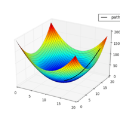Federated Learning (FL) is a novel machine learning framework, which enables multiple distributed devices cooperatively to train a shared model scheduled by a central server while protecting private data locally. However, the non-independent-and-identically-distributed (Non-IID) data samples and frequent communication across participants may significantly slow down the convergent rate and increase communication costs. To achieve fast convergence, we ameliorate the conventional local updating rule by introducing the aggregated gradients at each local update epoch, and propose an adaptive learning rate algorithm that further takes the deviation of local parameter and global parameter into consideration. The above adaptive learning rate design requires all clients' local information including the local parameters and gradients, which is challenging as there is no communication during the local update epochs. To obtain a decentralized adaptive learning rate for each client, we utilize the mean field approach by introducing two mean field terms to estimate the average local parameters and gradients respectively, which does not require the clients to exchange their local information with each other at each local epoch. Numerical results show that our proposed framework is superior to the state-of-art FL schemes in both model accuracy and convergent rate for IID and Non-IID datasets.
相關內容
Federated learning (FL) is a distributed machine learning strategy that enables participants to collaborate and train a shared model without sharing their individual datasets. Privacy and fairness are crucial considerations in FL. While FL promotes privacy by minimizing the amount of user data stored on central servers, it still poses privacy risks that need to be addressed. Industry standards such as differential privacy, secure multi-party computation, homomorphic encryption, and secure aggregation protocols are followed to ensure privacy in FL. Fairness is also a critical issue in FL, as models can inherit biases present in local datasets, leading to unfair predictions. Balancing privacy and fairness in FL is a challenge, as privacy requires protecting user data while fairness requires representative training data. This paper presents a "Fair Differentially Private Federated Learning Framework" that addresses the challenges of generating a fair global model without validation data and creating a globally private differential model. The framework employs clipping techniques for biased model updates and Gaussian mechanisms for differential privacy. The paper also reviews related works on privacy and fairness in FL, highlighting recent advancements and approaches to mitigate bias and ensure privacy. Achieving privacy and fairness in FL requires careful consideration of specific contexts and requirements, taking into account the latest developments in industry standards and techniques.
Subgraphs of a larger global graph may be distributed across multiple devices, and only locally accessible due to privacy restrictions, although there may be links between subgraphs. Recently proposed subgraph Federated Learning (FL) methods deal with those missing links across local subgraphs while distributively training Graph Neural Networks (GNNs) on them. However, they have overlooked the inevitable heterogeneity between subgraphs comprising different communities of a global graph, consequently collapsing the incompatible knowledge from local GNN models. To this end, we introduce a new subgraph FL problem, personalized subgraph FL, which focuses on the joint improvement of the interrelated local GNNs rather than learning a single global model, and propose a novel framework, FEDerated Personalized sUBgraph learning (FED-PUB), to tackle it. Since the server cannot access the subgraph in each client, FED-PUB utilizes functional embeddings of the local GNNs using random graphs as inputs to compute similarities between them, and use the similarities to perform weighted averaging for server-side aggregation. Further, it learns a personalized sparse mask at each client to select and update only the subgraph-relevant subset of the aggregated parameters. We validate our FED-PUB for its subgraph FL performance on six datasets, considering both non-overlapping and overlapping subgraphs, on which it significantly outperforms relevant baselines. Our code is available at //github.com/JinheonBaek/FED-PUB.
Federated Learning is an evolving machine learning paradigm, in which multiple clients perform computations based on their individual private data, interspersed by communication with a remote server. A common strategy to curtail communication costs is Local Training, which consists in performing multiple local stochastic gradient descent steps between successive communication rounds. However, the conventional approach to local training overlooks the practical necessity for client-specific personalization, a technique to tailor local models to individual needs. We introduce Scafflix, a novel algorithm that efficiently integrates explicit personalization with local training. This innovative approach benefits from these two techniques, thereby achieving doubly accelerated communication, as we demonstrate both in theory and practice.
In conventional distributed learning over a network, multiple agents collaboratively build a common machine learning model. However, due to the underlying non-i.i.d. data distribution among agents, the unified learning model becomes inefficient for each agent to process its locally accessible data. To address this problem, we propose a graph-attention-based personalized training algorithm (GATTA) for distributed deep learning. The GATTA enables each agent to train its local personalized model while exploiting its correlation with neighboring nodes and utilizing their useful information for aggregation. In particular, the personalized model in each agent is composed of a global part and a node-specific part. By treating each agent as one node in a graph and the node-specific parameters as its features, the benefits of the graph attention mechanism can be inherited. Namely, instead of aggregation based on averaging, it learns the specific weights for different neighboring nodes without requiring prior knowledge about the graph structure or the neighboring nodes' data distribution. Furthermore, relying on the weight-learning procedure, we develop a communication-efficient GATTA by skipping the transmission of information with small aggregation weights. Additionally, we theoretically analyze the convergence properties of GATTA for non-convex loss functions. Numerical results validate the excellent performances of the proposed algorithms in terms of convergence and communication cost.
Federated learning (FL) allows a large number of clients to collaboratively train machine learning (ML) models by sending only their local gradients to a central server for aggregation in each training iteration, without sending their raw training data. Unfortunately, recent attacks on FL demonstrate that local gradients may leak information about local training data. In response to such attacks, Bonawitz \textit{et al.} (CCS 2017) proposed a secure aggregation protocol that allows a server to compute the sum of clients' local gradients in a secure manner. However, their secure aggregation protocol requires at least 4 rounds of communication between each client and the server in each training iteration. The number of communication rounds is closely related not only to the total communication cost but also the ML model accuracy, as the number of communication rounds affects client dropouts. In this paper, we propose FSSA, a 3-round secure aggregation protocol, that is efficient in terms of computation and communication, and resilient to client dropouts. We prove the security of FSSA in honest-but-curious setting and show that the security can be maintained even if an arbitrarily chosen subset of clients drop out at any time. We evaluate the performance of FSSA and show that its computation and communication overhead remains low even on large datasets. Furthermore, we conduct an experimental comparison between FSSA and Bonawitz \textit{et al.}'s protocol. The comparison results show that, in addition to reducing the number of communication rounds, FSSA achieves a significant improvement in computational efficiency.
Federated learning (FL) shines through in the internet of things (IoT) with its ability to realize collaborative learning and improve learning efficiency by sharing client model parameters trained on local data. Although FL has been successfully applied to various domains, including driver monitoring applications (DMAs) on the internet of vehicles (IoV), its usages still face some open issues, such as data and system heterogeneity, large-scale parallelism communication resources, malicious attacks, and data poisoning. This paper proposes a federated transfer-ordered-personalized learning (FedTOP) framework to address the above problems and test on two real-world datasets with and without system heterogeneity. The performance of the three extensions, transfer, ordered, and personalized, is compared by an ablation study and achieves 92.32% and 95.96% accuracy on the test clients of two datasets, respectively. Compared to the baseline, there is a 462% improvement in accuracy and a 37.46% reduction in communication resource consumption. The results demonstrate that the proposed FedTOP can be used as a highly accurate, streamlined, privacy-preserving, cybersecurity-oriented, and personalized framework for DMA.
Partial client participation has been widely adopted in Federated Learning (FL) to reduce the communication burden efficiently. However, an inadequate client sampling scheme can lead to the selection of unrepresentative subsets, resulting in significant variance in model updates and slowed convergence. Existing sampling methods are either biased or can be further optimized for faster convergence.In this paper, we present DELTA, an unbiased sampling scheme designed to alleviate these issues. DELTA characterizes the effects of client diversity and local variance, and samples representative clients with valuable information for global model updates. In addition, DELTA is a proven optimal unbiased sampling scheme that minimizes variance caused by partial client participation and outperforms other unbiased sampling schemes in terms of convergence. Furthermore, to address full-client gradient dependence,we provide a practical version of DELTA depending on the available clients' information, and also analyze its convergence. Our results are validated through experiments on both synthetic and real-world datasets.
In federated learning, all networked clients contribute to the model training cooperatively. However, with model sizes increasing, even sharing the trained partial models often leads to severe communication bottlenecks in underlying networks, especially when communicated iteratively. In this paper, we introduce a federated learning framework FedD3 requiring only one-shot communication by integrating dataset distillation instances. Instead of sharing model updates in other federated learning approaches, FedD3 allows the connected clients to distill the local datasets independently, and then aggregates those decentralized distilled datasets (e.g. a few unrecognizable images) from networks for model training. Our experimental results show that FedD3 significantly outperforms other federated learning frameworks in terms of needed communication volumes, while it provides the additional benefit to be able to balance the trade-off between accuracy and communication cost, depending on usage scenario or target dataset. For instance, for training an AlexNet model on CIFAR-10 with 10 clients under non-independent and identically distributed (Non-IID) setting, FedD3 can either increase the accuracy by over 71% with a similar communication volume, or save 98% of communication volume, while reaching the same accuracy, compared to other one-shot federated learning approaches.
The majority of work in privacy-preserving federated learning (FL) has been focusing on horizontally partitioned datasets where clients share the same sets of features and can train complete models independently. However, in many interesting problems, such as financial fraud detection and disease detection, individual data points are scattered across different clients/organizations in vertical federated learning. Solutions for this type of FL require the exchange of gradients between participants and rarely consider privacy and security concerns, posing a potential risk of privacy leakage. In this work, we present a novel design for training vertical FL securely and efficiently using state-of-the-art security modules for secure aggregation. We demonstrate empirically that our method does not impact training performance whilst obtaining 9.1e2 ~3.8e4 speedup compared to homomorphic encryption (HE).
Federated learning enables multiple parties to collaboratively train a machine learning model without communicating their local data. A key challenge in federated learning is to handle the heterogeneity of local data distribution across parties. Although many studies have been proposed to address this challenge, we find that they fail to achieve high performance in image datasets with deep learning models. In this paper, we propose MOON: model-contrastive federated learning. MOON is a simple and effective federated learning framework. The key idea of MOON is to utilize the similarity between model representations to correct the local training of individual parties, i.e., conducting contrastive learning in model-level. Our extensive experiments show that MOON significantly outperforms the other state-of-the-art federated learning algorithms on various image classification tasks.





